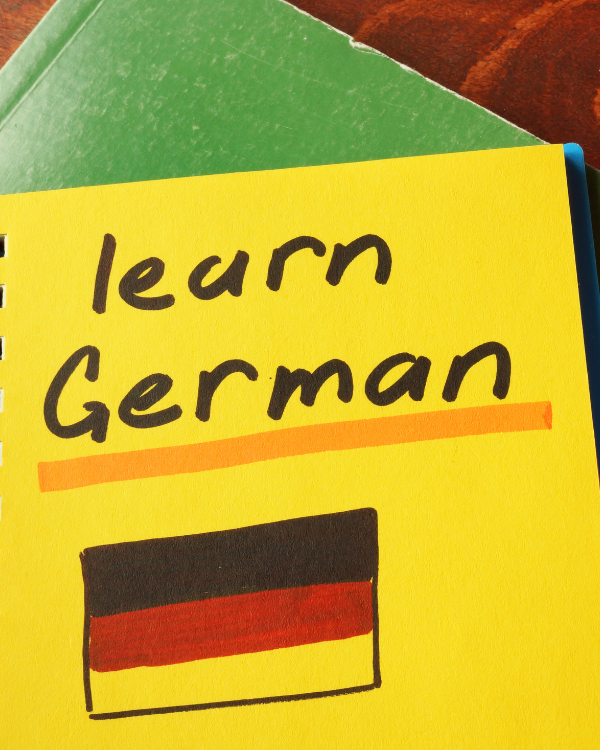
Thanks to our forward-thinking educational system, the vast majority of Singaporeans are already bilingual, speaking our first language with friends and family and learning our second in school. When you are bilingual, learning more languages comes a tad easier, as you’ve already acquired linguistic skills that will stand you in good stead not only in school but also in life.
You know what’s better than being bilingual? Being multi-lingual! If you are looking at adding more languages to your repertoire, you could consider German. The German language holds significant importance both globally and regionally due to its cultural, economic, and scientific influence. With over 100 million native speakers, it is one of the most widely spoken native languages in Europe. However, German isn’t an easy language to master. Fret not. We at Private Tutor SG are here to help!

Our Private German Language Tutors
Our team of passionate language instructors comes from diverse backgrounds, offering a wide range of expertise. From native German speakers to highly proficient tutors, our educators hold qualifications ranging from Bachelor’s Degrees to PhDs, ensuring they are equipped to teach German at all levels, from beginner to advanced.
In addition to their strong academic credentials, we carefully select our tutors for their teaching methodologies, patience, cultural knowledge, proven success, and adaptability. Our tutors are experienced in various teaching approaches, including interactive sessions, practical exercises, conversational practice, immersive learning, and real-world applications. They are also trained to tailor lessons to each student’s unique learning style and specific needs.
Why Get A Private German Tutor?
Cultural Insights
Learning German with a tutor, especially a native speaker, provides valuable cultural insights that go beyond textbooks. Understanding the culture is essential for mastering the language, as it helps you grasp context, idiomatic expressions, and appropriate formalities. A tutor can teach you how to navigate social situations in German-speaking countries, from polite expressions to body language.
This deeper cultural awareness makes your language use more authentic and prepares you for real-world interactions. Additionally, a tutor can introduce you to German traditions, festivals, and customs, enriching your learning experience and making the language more engaging.
Personalised Learning Experience
Not everyone learns at the same pace or with the same style. A dedicated German tutor will tailor a customised lesson plan to suit your specific goals, pace, and unique learning style, accelerating your progress and focusing on your weaknesses. If you’re struggling with grammar, vocabulary, or pronunciation, a tutor can dedicate extra time to those areas.
Unlike group classes, where lessons follow a set curriculum, a tutor adapts to your needs, making each session productive. This personalized approach ensures that you build a strong foundation in German, preventing gaps in your knowledge. Whether you’re preparing for exams or learning for personal reasons, a tailored plan accelerates progress and keeps you motivated.
Extensive Practice
Speaking is one of the most difficult aspects of language learning, and a private tutor provides regular, focused conversation practice. A tutor creates a comfortable, judgment-free environment where you can improve your speaking fluency, pronunciation, and listening skills. This constant practice is essential for building confidence in real-life situations, whether you’re traveling, working, or socializing in a German-speaking environment.
Additionally, tutors can teach colloquial phrases and expressions that textbooks often overlook, making your spoken German more natural and conversational. By practicing regularly with a native or experienced speaker, you can significantly improve your verbal communication.
Feedback and Correction
A German tutor offers immediate feedback on your mistakes, whether in grammar, pronunciation, or sentence structure. This immediate correction helps prevent bad habits from forming and ensures that you are learning accurately from the beginning. Unlike self-study or group classes, where errors may go unnoticed, a tutor can pinpoint specific issues and guide you toward improvement.
This level of attention not only sharpens your language skills but also boosts your confidence. You’ll gain a clearer understanding of German’s rules and nuances, making it easier to progress and feel more comfortable using the language in everyday situations.

Common Challenges Faced By German Language Students
German grammar is notoriously complex, with intricate rules and numerous exceptions that can overwhelm learners. One of the main challenges is mastering the various cases (nominative, accusative, dative, and genitive), which change the form of nouns, articles, and adjectives based on their role in the sentence.
Understanding and applying these cases correctly requires a solid grasp of grammatical structures, something that often takes time to internalize. Verb conjugation and sentence structure, especially in subordinate clauses, can also be difficult. These complexities demand consistent study and practice to ensure accuracy in both written and spoken German.
German pronunciation can be a challenge, especially for learners unfamiliar with sounds like "ü," "ö," and "ä" (the umlauts). These vowel sounds have no direct equivalents in many other languages, making them hard to master. Additionally, German features long and short vowel distinctions, which, if mispronounced, can change the meaning of words.
The guttural "r" sound is also difficult for many learners to produce. Pronouncing compound words and differentiating between similar-sounding words further adds to the challenge. Consistent practice with native speakers or listening exercises is crucial to mastering these nuances of German pronunciation.
German word order, particularly in complex sentences, can be difficult for learners to grasp. In German, the verb often appears at the end of subordinate clauses, which differs significantly from English and other languages.
This Subject-Object-Verb (SOV) structure can feel unnatural for beginners. Additionally, mastering separable verbs, where prefixes are placed at the end of a sentence, adds another layer of complexity. Learning how to structure sentences correctly requires a lot of practice and can be especially confusing during conversations, where the natural flow of language often forces learners to think ahead.
German is known for its extensive vocabulary, including long compound words that can be daunting for learners. Words like "Geschirrspülmaschine" (dishwasher) or "Kraftfahrzeug-Haftpflichtversicherung" (car insurance) are challenging to understand, pronounce, and remember.
Additionally, many German words have subtle meanings or multiple uses depending on context, which can confuse learners. German also borrows from other languages and has a rich collection of idiomatic expressions that may not translate easily into English. Building a robust vocabulary in German requires time, consistent exposure to native speakers, and practice understanding how words function in different contexts.
Frequently Asked Questions (FAQs)
Anyone can learn German, regardless of age! We tutor all students from little six-year-olds to professional adults looking to improve their linguistic skills.
For a start, we recommend 2-3 lessons weekly but of course, the schedule is up to you.
Yep! We offer online one-on-one and group classes for all our language programmes.
Nope! You can start from the very beginning, and our beginner lessons are specifically tailored for those without prior knowledge.
After the first session, you can cancel your private German lessons anytime if you inform us at least 24 hours in advance. You’ll have to pay for all the lessons that have already been conducted, and if you terminate less than 24 hours before your next lesson, you’ll incur a 50% charge of the lesson’s fee.